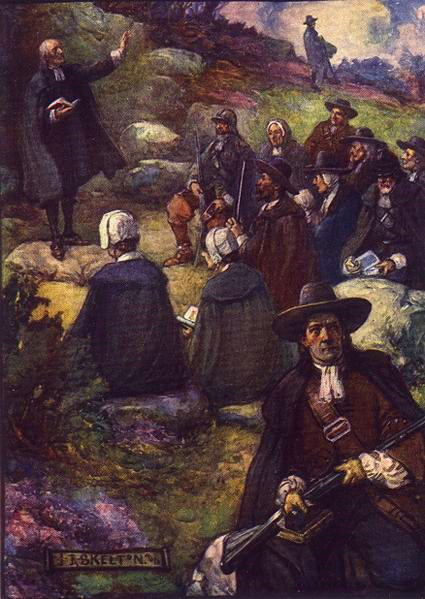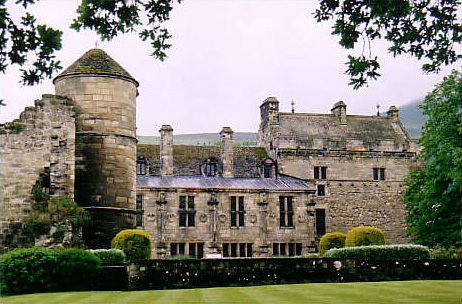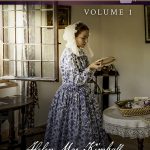
He was first ordained minister at Cramond, but was afterwards transported to Stirling, where he continued until his death. He was a faithful contender against the lordly encroachments of prelacy. In the year 1584, when there was an express charge given by the king to the ministers, either to acknowledge Mr. Patrick Adamson as arch-bishop of St. Andrews, or else to lose their benefices, Mr. Simpson opposed that order with all his power, although Mr. Adamson was his uncle by the mother’s side; and when some of his brethren seemed willing to acquiesce in the king’s mandate, and subscribe their submission to Adamson, so far as it was agreeable to the word of God, he rebuked them sharply, saying, It would be no salve to their consciences, seeing it was altogether absurd to subscribe an agreement with any human invention, when it was condemned by the word of God. A bishopric was offered him, and an yearly pension besides from the king, in order to bring him into his designs, but he positively refused all, saying, That he regarded that preferment and profit as a bribe to enslave his conscience, which was dearer to him than any thing whatever; he did not stop with this, but having occasion anno 1598, to preach before the king, he publicly exhorted him to beware that he drew not the wrath of God upon himself in patronizing a manifest breach of divine laws: Immediately after sermon, the king stood up and charged him not to intermeddle in these matters.
When the assembly which was held at Aberdeen anno 1684, was condemned by the state, and in a very solemn manner denounced the judgment of God against all such as had been concerned in distressing, and imprisoning the ministers of Linlithgow, who maintained the lawfulness and justified the conduct of that assembly, and the protestation given in to the parliament in 1606, which did many things to the further establishment of prelacy. This protestation was wrote by him, and delivered out of his own hands to the earl of Dunbar. (Read full text of protestation)
He was not more distinguished for zeal in the cause of Christ, than for piety and an exemplary life, which had a happy effect upon the people with whom he stood connected. He was in a very eminent degree blessed with the spirit and return of prayer; the following fact attested by old Mr. Row of Carnock, shews how much of the divine countenance he had in his duty:—His wife, Martha Baron, a woman of singular piety, fell sick, and, under her indisposition, was strongly assaulted by the common enemy of salvation; suggesting to her, that she should be delivered up to him, which soon brought her into a very distracted condition, and continued, for some time, increasing; she broke forth into very dreadful expressions:—She was in one of these fits of despair, one Sabbath morning, when Mr. Simpson was going to preach; he was exceedingly troubled at her condition, and went to prayer, which she took no notice of. After he had done, he turned to the company present, and said, That they who had been witnesses to that sad hour, should yet see a gracious work of God on her, and that the devil’s malice against that poor woman, should have a shameful foil. Her distraction continued for some days after. On a Tuesday morning, about day-break, he went into his garden as private as possible, and one Helen Gardiner, wife to one of the baillies of the town, a godly woman, who had sate up that night with Mrs. Simpson, being concerned at the melancholy condition he was in, climbed over the garden wall, to observe him in this retirement, but, coming near the place where he was, she was terrified with a noise which she heard, as of the rushing of multitudes of people together, with a most melodious sound intermixed; she fell on her knees and prayed that the Lord would pardon her rashness, which her regard for his servant had caused. Afterwards, she went forward, and found him lying on the ground; she intreated him to tell her what had happened unto him, and, after many promises of secrecy, and an obligation, that she should not reveal it in his life-time, but, if she survived him, she should be at liberty, he then said, “O! what am I! being but dust and ashes! that holy ministring spirits should be sent with a message to me!” And then told her, That he had had a vision of angels, who gave him an audible answer from the Lord, respecting his wife’s condition; and then, returning to the house, he said to the people who attended his wife, “Be of good comfort, for I am sure that ere ten hours of the day, that brand shall be plucked out of the fire.” After which he went to prayer, at his wife’s bed-side;—she continued for some time quiet, but, upon his mentioning Jacob wrestling with God, she sat up in the bed, drew the curtain aside, and said, “Thou art this day a Jacob, who hast wrestled and hast prevailed, and now God hath made good his word, which he spoke this morning to you, for I am pluckt out of the hands of Satan, and he shall have no power over me.” This interruption made him silent for a little, but afterwards, with great melting of heart, he proceeded in prayer, and magnified the riches of grace towards him. From that hour she continued to utter nothing but the language of joy and comfort, until her death, which was on the Friday following, August 13th, 1601.

Mr. Simpson lived for several years after this, fervent and faithful in the work of the ministry. In the year 1608 when the bishops and some commissioners of the general assembly conveened in the palace of Falkland, the ministers assembled in the kirk of the town, and chose him for their moderator; After which they spent some time in prayer, and tasted some of the comfort of their former meetings. They then agreed upon some articles for concord and peace to be given into the bishops, &c.——This Mr. Simpson and some others did in the name of the rest, but the bishops shifted them off to the next assembly, and in the mean time, took all possible precautions to strengthen their own party, which they effected.
In 1610, the noblemen and bishops came to Stirling, after dissolving the assembly. In preaching before them, he openly charged the bishops with perjury and gross defection. They hesitated for some time, whether they should delate him, or compound the matter:—But, after deliberation, they dropt the affair altogether for the present.——There is no reason to doubt but he would have been subjected to the same sufferings with many others of his brethren, had he lived, but before the cope-stone was laid on prelacy in Scotland, he had entered into the joy of his Lord.——For, in the month of March 1618, which was about four months before the Perth assembly, when the five articles were agreed upon, 1 he said that this month should put an end to all his troubles, and he accordingly died about the end of it, blessing the Lord, that he had not been perverted by the sinful courses of these times; and said, As the Lord had said to Elijah in the wilderness, so, in some respects he had dealt with him all the days of his life.
He wrote a history of the church, for the space of about ten centuries. There are some other little tracts, besides a history of the councils of the church, which are nearly out of print altogether. Upon some of his books he had written, “Remember, O my soul, and never forget the 9th of August, what consolation the Lord gave thee, and how he performed what he spake according to Zech. iii. 2, Is not this a brand pluckt out of the fire?” &c.







